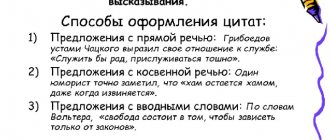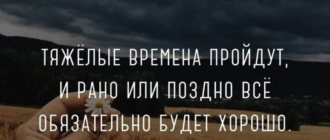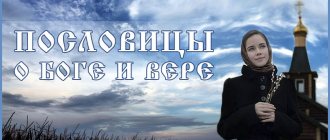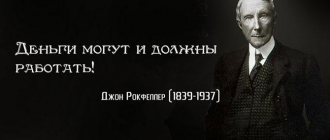Proverbs and sayings about knowledge
People have valued knowledge at all times. Even in Ancient Greece, it was generally accepted that a successful person was one who had good physical characteristics - handsome, strong and dexterous. However, along with this, the Greeks also valued intelligence and curiosity. Therefore, it is not surprising that one of their favorite pastimes was solving riddles. “The world is illuminated by the sun, and man is illuminated by knowledge,” people say, which is what the following selection of proverbs and sayings about knowledge is about.
- The more you learn, the stronger you will become.
- Any half-knowledge is worse than any ignorance.
- Where there is no knowledge, there is no courage.
- A guess is good, but knowledge is better.
- It is not the one who has lived a lot who knows, but the one who has acquired knowledge.
- You know the score, you can count it yourself.
- Know more and say less.
- Know-nothing is running along the path, and Dunno is lying on the stove.
- Knowledge and science do not hang at the gate.
- Knowledge and wisdom adorn a person.
- Knowledge is better than wealth.
- Gold comes from the earth, and knowledge comes from books.
- Those who know the basics and basics will find books in their hands.
- He who knows the way does not stumble.
- He who knows a lot, asks a lot.
- He who wants to know a lot needs little sleep.
- It's easy to forget what you don't know.
- Don't be afraid when you don't know: it's scary when you don't want to know.
- Don't say what you studied, but say what you learned.
- Don't be proud of your title, but be proud of your knowledge.
- It's not a shame not to know, it's a shame not to learn.
- A person without knowledge is like a mushroom: although he looks strong, he doesn’t hold onto the ground well.
Quotes and aphorisms about self-knowledge
You won't be able to find yourself by following your trail. Dominik Opolski
Paradox: compared to myself, I am nothing. Karol Izhikowski
“Be yourself” is the worst advice you can give to some people. Tom Masson
I want to be myself, but my conscience does not allow me. Boris Krutier
Just like with anyone else, you can get used to yourself without ever recognizing yourself. Grigory Landau
Know yourself! Thales of Miletus
Only shallow people know themselves to the very depths. Oscar Wilde
Don’t try to know yourself, otherwise you will become disgusted. Don Aminado
Self-knowledge requires testing: no one will know what he can do unless he tries. Seneca
I am the only person in the world whom I would like to get to know better. Oscar Wilde
Know yourself, but leave yourself room for surprises. Jacques Deval
We are what others think we are: we know ourselves mainly by hearsay. Eric Coffer
If we do not see ourselves as others see us, it is because love is blind.
Unlike the vast majority of people, I am an average person. Ashley Brilliant
I am a deeply superficial person. Andy Warhol
I am capable of the best, and at the worst I am the best. Coluche
I could never understand two things: myself and others. Erkki Iirkkanen
The more I get to know myself, the more different I become from myself. Ashley Brilliant
It’s better to do bad things to yourself than to talk bad about yourself, and it’s better to talk bad about yourself than to think bad about yourself. Jean Rostand
Understanding yourself is difficult, forgiving is easy. Boris Krutier
We are always ready to condemn our shortcomings if we notice them in others.
Time changes all our opinions, except our opinion about ourselves.
Our judgment of others is not as changeable as our judgment of ourselves. Luc de Vauvenargues
Let everyone know their abilities and let them strictly judge themselves, their virtues and vices. Cicero Marcus Tullius
He who knows himself best respects himself least. Lev Nikolaevich Tolstoy
“Know thyself” is excellent and useful advice; It’s just a pity that the ancients didn’t think of showing a way to use this advice. Anton Pavlovich Chekhov
A psychology that boils down to digging into details is wrong. People search for themselves, study. To know yourself, to assert yourself. Psychology is action, not soul-searching. A person is in search throughout his life. To know yourself completely means to die. Albert Camus
Few people know themselves and have the ability to introspect. Alfred Adler
The most difficult thing for a human being is to know and change oneself. Alfred Adler
The ability to know ourselves grows with our ability to understand the reasons for our actions and the dynamics of our soul. Alfred Adler
Neither the individual nor anyone else around him has yet known himself. Ernst Simon Bloch
We need to not look around, but look into ourselves. Benedetto Croce
The most serious people seem to me like children who do not know themselves. Georges Bataille
Odysseus's wanderings are the path to the Center, to Ithaca, that is, the path to himself. Mircea Eliade
More on the topic:
- Thinking, opinion, common sense, assessments
- Beliefs - quotes and aphorisms
- Judgment - quotes and aphorisms
Popular:
- Meetings and separations
- Happiness and unhappiness
- Quotes by Paulo Coelho
Comments:
S. FayzullinaMCC trainer
One of the most important problems of upbringing and education at the present stage of development of society is the problem of spiritual and moral development of the individual. The goal of education is the comprehensive holistic development of the child. In the process of education, the IMAGE of a person is formed, a conscious person, a person of perfect character.
And here the precepts of Abai Kunanbayev come and are remembered, who wrote “... the vessel that stores the mind and knowledge is the character of a person.” Perfect character is the unity and agreement of three: Heart, Mind and Hands, unity of thoughts, words and deeds. It is very important today to create an environment in which the development of a child’s personality occurs.
The relevance of the problem of spiritual and moral education is connected with the following provisions:
Firstly, our society needs to prepare highly moral people who have not only knowledge, but also excellent character.
Secondly, in the modern world, the fragile intellect and feelings of a child, the still emerging sphere of morality, are subject to various sources of strong influence, both positive and negative.
Thirdly, education in itself does not guarantee a high level of moral upbringing, since upbringing is a personality quality that determines in a person’s everyday behavior his attitude towards other people, based on respect and goodwill towards each person.
Fourthly, equipping with moral knowledge is also important because it not only informs the child about the norms of behavior established in modern society, but also gives ideas about the consequences of violating norms or the consequences of this act for the people around him.
The reality of today dictates the need to find ways to reveal and cultivate in the souls of children the need for eternal universal values, to cultivate a person with good character, with a clear conscience, a person with moral qualities. These values, such as Truth, Love, Righteous Conduct, Inner Peace and Non-Violence, are values that will ultimately lead to the achievement of the goal of all pedagogical activities of the school - the education of Man.
And more than ever, it is necessary to note the importance and significance of the “Self-Knowledge” lesson. The lesson “Self-Knowledge” differs from other lessons in conceptual, ideological, educational, and essential aspects. A lesson in self-knowledge is not a lesson in psychology, knowledge of the world, literature or music, it is a lesson about Man. The essence of the lesson Self-knowledge is the daily and constant self-improvement of a person. And this process of self-improvement takes place not only in students, but also in the Teacher himself.
Therefore, the professional responsibility of a teacher of self-knowledge is important - the teacher must love children, love his craft, and he himself must be a Person. Teacher of humane pedagogy Sh.A. notes this more than once in his works. Amonashvili “And the School is the Teacher himself, every Teacher is a School, for he is the bearer of the spiritual Rock for the student. Where the Teacher is, there is the School.”
And for the school, the process of the lesson itself is important. A lesson is a phenomenon, a lesson is a discovery, a lesson is knowledge, a lesson is a sacrament! and as Sh. Amonashvili notes, “ The lesson is fate (fate) ..., the basis of life, the model of life, the path, the way in which we can survive in life. Children do not prepare for life, they live! In the classroom, it is not learning that is important, but development.”
That is, we can say that during the lesson a model of the student’s life occurs and is lived out.
How is the structure of a self-knowledge lesson built, and what methodological techniques can most effectively approach the goals and objectives of the lesson? The lesson, like any other lesson, begins with an organizational moment. It is very important to concentrate on the lesson, both for the teacher and for the students. Collect your thoughts, heart and soul for discoveries. To do this, you need to remember and repeat the 5 Ds, i.e. discipline, duty, kindness, friendship and trust. When discipline is carried out, everyone fulfills his duty (both the teacher and the students, each of us, fulfills his duty), our duty is to learn. If we do our duty, then we are kind to others. When we are kind, we show friendship to each other, and trust arises between us.
Methodological technique of a positive attitude , one of the important and significant methods of the lesson. Why is this method carried out at the beginning of the lesson, so that students can overcome the state of emotional excitement, hyperactivity, calm down and tune in to a deep spiritual and moral conversation. The duration of the positive attitude is from 2 to 5 minutes. What is important for a teacher who promotes a positive attitude is that it is important to be in a state of peace and love. Otherwise, we cannot talk about the effectiveness of this method. If a teacher can find love, peace and light in himself, he will be able to successfully reveal this in his students. The process of carrying out a positive attitude is so interconnected and built in a teacher-student model.
A positive attitude towards goodness, love and light creates a sense of balance, harmony and inner happiness and peace in the child’s soul.
The next teaching technique that is successfully used in a lesson, which students like and inspires teachers, is the use of quote . It is important to choose a quote that reflects the value we are revealing in the lesson. Then there is no need to explain the value and explain it, which takes time. To do this, students write down the quote in their notebooks and repeat everything in chorus. They remember. What work with quotations gives you is memorized and recited exalted quotes - all this will remain in the subconscious and will contribute to the development of good thoughts, truthful speech and healthy habits in everyday life.
The methodological technique of telling stories, parables, in other words, one might say, is a kind of gift from the teacher. All children, without exception, love to listen to stories and fairy tales. And this is natural, even when the child is in the cradle, he listens to the different sounds that surround him. This is a lullaby from mother and grandmother. kind and affectionate words that nourish and support him. The wise and valuable stories a teacher tells are essential to a student's development. It is important for the teacher that the story he brought to the students as a gift is interesting to the children, so that it meets age requirements and reveals value. The teacher needs to prepare a series of questions to ask the students in order to build a dialogue where, through pre-prepared questions, it will be possible to reveal universal human values in the child.
Creative activities and group work are another important method of self-knowledge lessons. Man is a collective being; he lives and works in society and for society. It is important to carry out creative activities in a self-knowledge lesson in subgroups, that is, divide them into subgroups. It is important that this method is taught in every lesson.
Human values can be instilled in students through group games, skits and creative work. What happens in the process of creative activity is that students reinforce the values that were revealed in the lesson only through certain activities (game, skit, test, solving crossword puzzles, writing poetry, etc.).
The next methodological technique used in the lesson is group singing. All children love to sing. This is important for every teacher to know. For a teacher, this is one of the ways to bring children into contact with the world of beauty and spirituality. The teacher selects the song in such a way that the words of the song reflect the values and qualities that were discussed in the lesson. That is, a unique awareness and understanding of these values and qualities occurs in the child’s soul.
And the final moment of the lesson is the final minute of the lesson . This is a kind of summary of the lesson, the teacher summarizes the lesson. It is important to bring students and the teacher himself to this stage of the lesson. It is important to remember what was discussed in class today. To remember and remember, that is, to put in the minds of the students the light, warmth and goodness of the lesson.
Master of Pedagogy Sh.A. Amonashvili explains: “All school teaching and all school life must be imbued with a rational and moral element. At school, seriousness should reign, allowing for jokes, but not turning the whole matter into a joke, affection without cloying, justice without pickiness, kindness without weakness, order without pedantry and, most importantly, constant reasonable activity. Then good feelings and aspirations will naturally develop in children, and the beginnings of bad inclinations, perhaps acquired earlier, will gradually be smoothed out. This, so to speak, hygienic influence of the school acts unnoticeably, but is extremely strong and durable. It is much more important than the pathological influence that the school has with rewards, punishments and moral instructions.”
Literature:
- Sh.A. Amonashvili “School of Life”, “ Shalva Amonashvili Publishing House” Moscow, 1998
- Sh.A. Amonashvili “Without a heart, what will we understand?”, Shalva Amonashvili Publishing House, Moscow, 2004
- “I am a Man” compiled by A.K. Dautova Almaty “Dauir”, 2000
- “Methodology for teaching the discipline “Self-knowledge” by R.A. Mukazhanova, G.A. Omarova Almaty, NNPOOTS "Bobek", 2013








